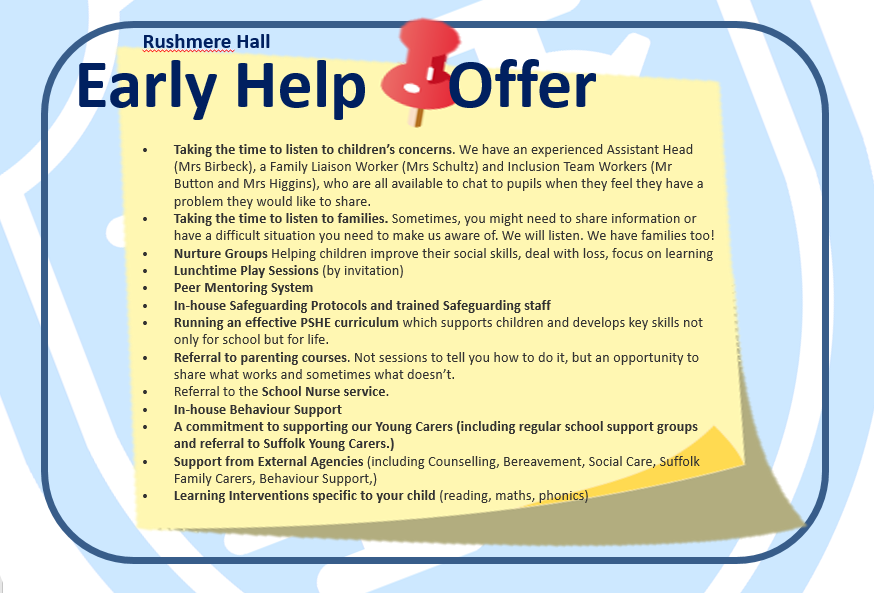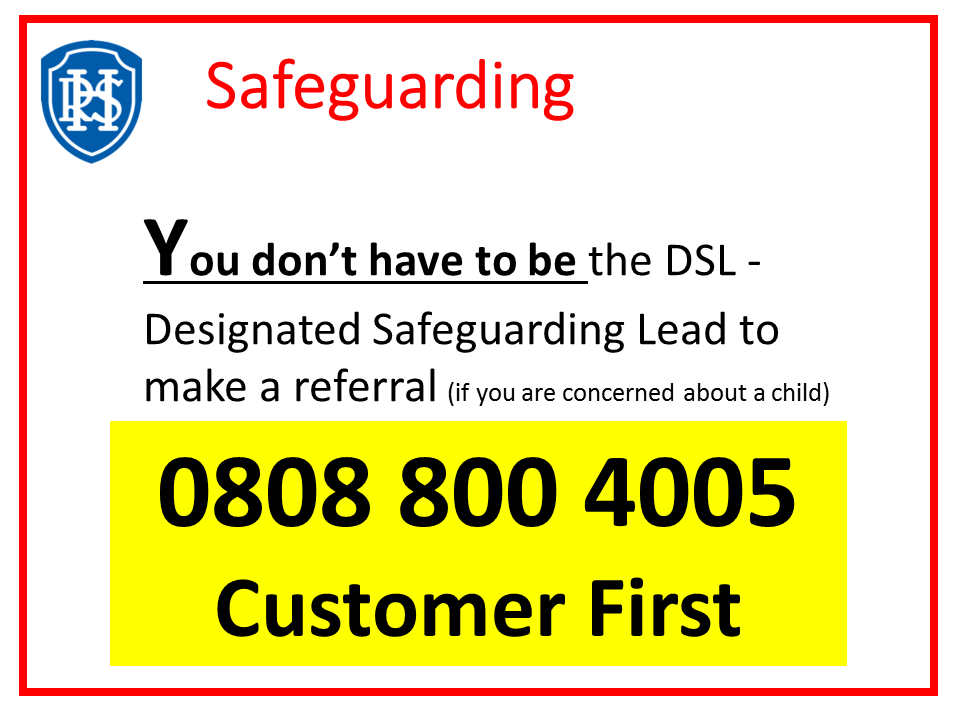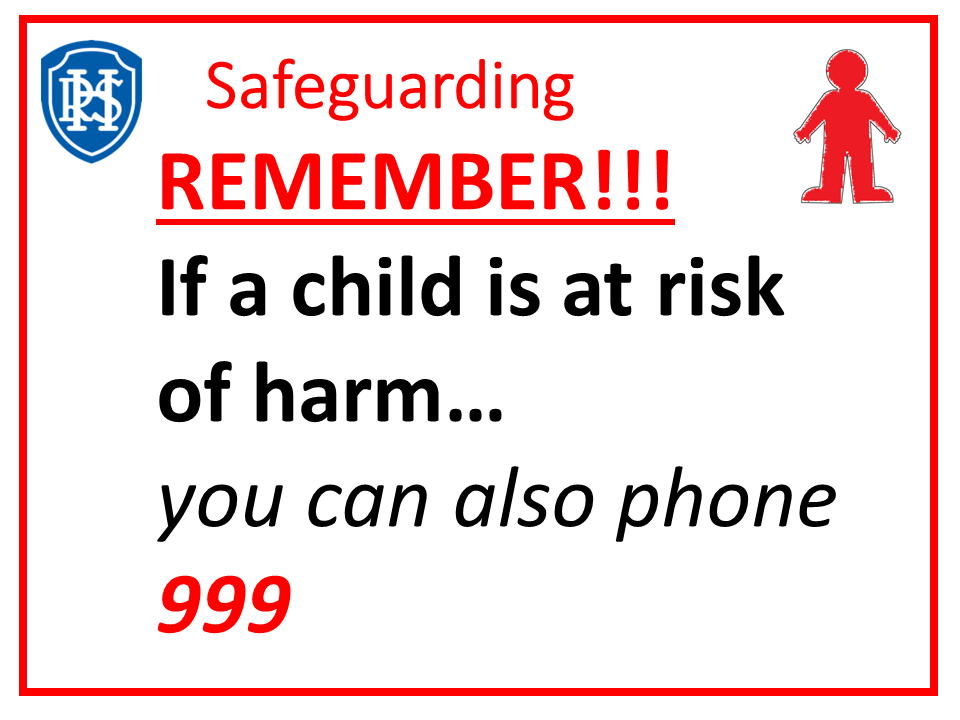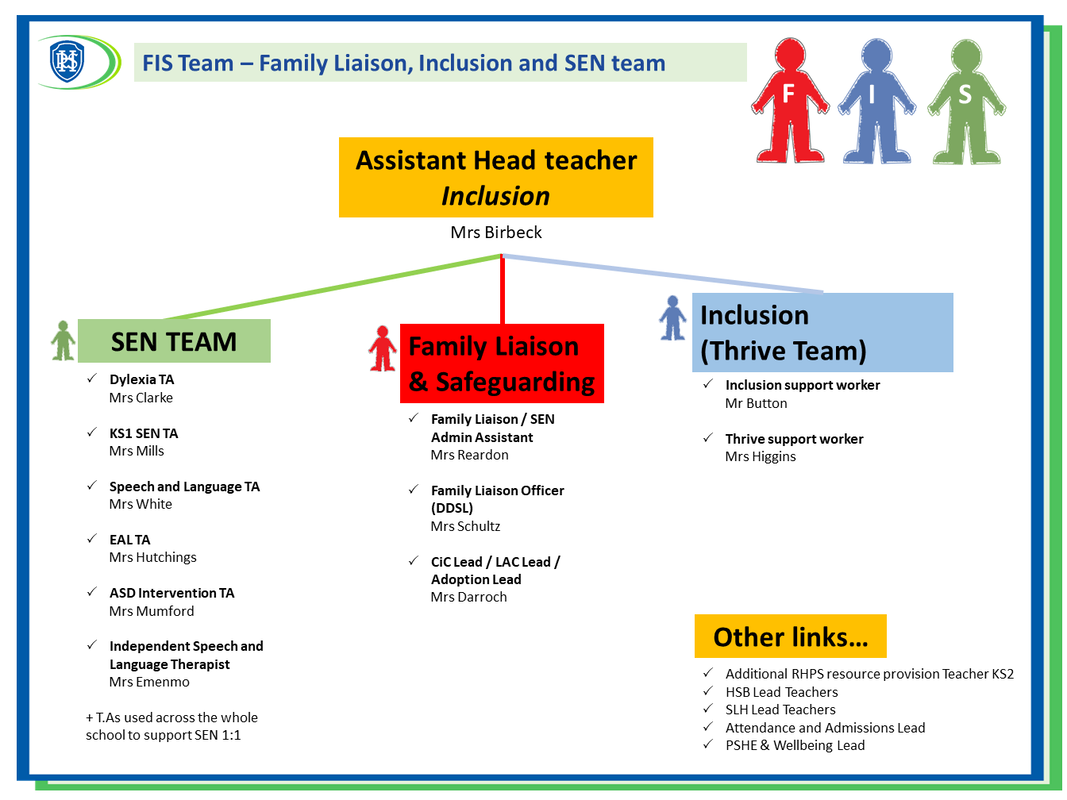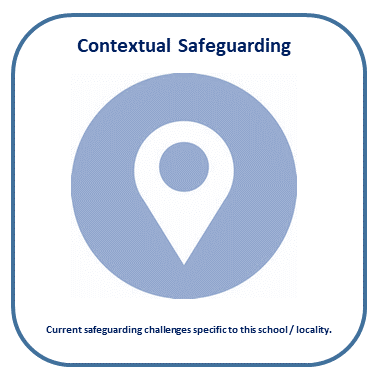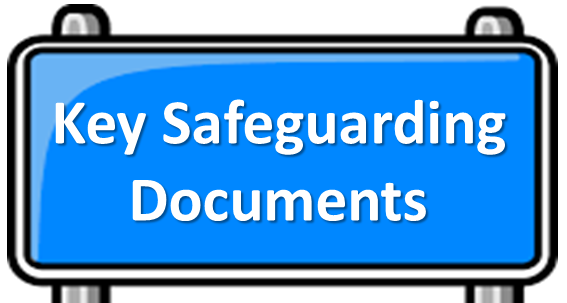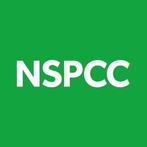Early Help, Safeguarding and Child Protection at Rushmere HallAt Rushmere Hall, the safety and well-being of our pupils is our top priority. This page provides information and resources about Early Help, Safeguarding and Child Protection. Here you will find details about how we keep children safe, what to do if you have a concern, and helpful resources for parents and carers. We are committed to working together with families and the wider community to ensure all our children feel happy, secure and able to thrive.
If you have a concern about a child's well-being you must contact the school as soon as possible and make contact with our Designated Safeguarding lead. Outside of school hours? The number for Customer First (Local Authority Safeguarding Team) is below, use this number to report your concerns. **Remember Safeguarding and protecting children is EVERYONEs responsibility.** Our school places high priority on the protection and safety of our pupils.
In the event that you need to make contact with the school, we have designated trained staff available for you to talk to. We call these people DESIGNATED SAFEGUARDING LEADS. They have access to a range of services, including Police and Social Services as well as other external agencies. PLEASE CALL THE SCHOOL on 01473 726027 and request to speak to Helen Birbeck or Louise Schultz Our Designated Safeguarding Lead is: Mrs H. Birbeck (Assistant Head: Inclusion) Our Deputy Designated Safeguarding Lead is: Mrs L. Schultz (Family Liaison Officer) Our staff receive training in recording important information that is then passed on to a Designated Safeguarding Lead. Staff at the school have a responsibility to protect children and, at times, this may mean taking action and referring serious concerns to highly trained professionals outside the school |
Domestic Violence.
Online Gaming. Post pandemic mental health and wellbeing.
| ||||||||||||||||||
Key links and information
ADDITIONAL ADVICE AND SUPPORT
There is a wealth of information available to support schools and colleges. The following list is not exhaustive but should provide a useful starting point:
Abuse
Supporting practice in tackling child sexual abuse - CSA Centre Centre of Expertise on Child Sexual Abuse has free evidence-based practice resources to help professionals working with children and young people to identify and respond appropriately to concerns of child sexual abuse.
What to do if you're worried a child is being abused – DfE advice
Domestic abuse: Various Information/Guidance - Home Office (HO)
Faith based abuse: National Action Plan - DfE advice
Disrespect NoBody campaign - GOV.UK - Home Office website
Tackling Child Sexual Abuse Strategy – Home Office policy paper
Together we can stop child sexual abuse – HM Government campaign
Bullying
Preventing bullying including cyberbullying - DfE advice
CHILDREN MISSING FROM EDUCATION, HOME OR CARE
Children missing education - DfE statutory guidance
Child missing from home or care - DfE statutory guidance
Children and adults missing strategy - Home Office strategy
CHILDREN WITH FAMILY MEMBERS IN PRISON
National Information Centre on Children of Offenders - Barnardo’s in partnership with HM
Prison and Probation Service
CHILD EXPLOITATION
Trafficking: safeguarding children - DfE and Home Office guidance
Care of unaccompanied and trafficked children – DfE statutory guidance
Modern slavery: how to identify and support victims – HO statutory guidance
Child exploitation disruption toolkit - HO statutory guidance
County Lines Toolkit For Professionals - The Children's Society in partnership with Victim
Support and National Police Chiefs’ Council
CONFIDENTIALITY
Gillick competency Fraser guidelines - Guidelines to help with balancing children’s rights along with safeguarding responsibilities.
DRUGS#
Drug strategy 2021 - Home Office strategy
Information and advice on drugs - Talk to Frank website
Drug and Alcohol education — teacher guidance & evidence review – PSHE Association
(SO CALLED) “HONOUR BASED ABUSE” INCLUDING FGM AND FORCED MARRIAGE
Female genital mutilation: information and resources- Home Office guidance
Female genital mutilation: multi agency statutory guidance - DfE, Department for Health, and Home Office
Forced marriage - Forced Marriage Unit (FMU) resources
Forced marriage - Government multi-agency practice guidelines and multi-agency statutory guidance
FGM resource pack – HM Government guidance
HEALTH AND WELL-BEING
Rise Above: Free PSHE resources on health, wellbeing and resilience - Public Health England
Supporting pupils at schools with medical conditions - DfE statutory guidance
Mental health and behaviour in schools - DfE advice
Overview - Fabricated or induced illness - NHS advice
HOMELESSNESS
Homelessness code of guidance for local authorities – Department for Levelling Up,
Housing and Communities guidance
INFORMATION SHARING
Government information sharing advice - Guidance on information sharing for people who provide safeguarding services to children, young people, parents and carers.
Information Commissioner's Office: Data sharing information hub - Information to help schools and colleges comply with UK data protection legislation including UK GDPR.
ONLINE SAFETY-ADVICE
Childnet provide guidance for schools on cyberbullying
Educateagainsthate provides practical advice and support on protecting children from extremism and radicalisation
London Grid for Learning provides advice on all aspects of a school or college’s online safety arrangements
NSPCC E-safety for schools provides advice, templates, and tools on all aspects of a school or college’s online safety arrangements
Safer recruitment consortium “guidance for safe working practice”, which may help ensure staff behaviour policies are robust and effective
Searching screening and confiscation is departmental advice for schools on searching children and confiscating items such as mobile phones
South West Grid for Learning provides advice on all aspects of a school or college’s online safety arrangements
Use of social media for online radicalisation - A briefing note for schools on how social media is used to encourage travel to Syria and Iraq
Online Safety Audit Tool from UK Council for Internet Safety to help mentors of trainee teachers and newly qualified teachers induct mentees and provide ongoing support, development and monitoring
Online safety guidance if you own or manage an online platform DCMS advice
A business guide for protecting children on your online platform DCMS advice
UK Safer Internet Centre provide tips, advice, guides and other resources to help keep children safe online
ONLINE SAFETY- REMOTE EDUCATION, VIRTUAL LESSONS AND LIVE STREAMING
Guidance Get help with remote education resources and support for teachers and school leaders on educating pupils and students
Departmental guidance on safeguarding and remote education including planning remote education strategies and teaching remotely
London Grid for Learning guidance, including platform specific advice
National cyber security centre guidance on choosing, configuring and deploying video conferencing
UK Safer Internet Centre guidance on safe remote learning
ONLINE SAFETY- SUPPORT FOR CHILDREN
Childline for free and confidential advice
UK Safer Internet Centre to report and remove harmful online content
CEOP for advice on making a report about online abuse
ONLINE SAFETY- PARENTAL SUPPORT
Childnet offers a toolkit to support parents and carers of children of any age to start discussions about their online life, and to find out where to get more help and support
Commonsensemedia provide independent reviews, age ratings, & other information about all types of media for children and their parents
Government advice about protecting children from specific online harms such as child sexual abuse, sexting, and cyberbullying
Internet Matters provide age-specific online safety checklists, guides on how to set parental controls, and practical tips to help children get the most out of their digital world How Can I Help My Child? Marie Collins Foundation – Sexual Abuse Online
Let’s Talk About It provides advice for parents and carers to keep children safe from online radicalisation
London Grid for Learning provides support for parents and carers to keep their children safe online, including tips to keep primary aged children safe online
Stopitnow resource from The Lucy Faithfull Foundation can be used by parents and carers who are concerned about someone’s behaviour, including children who may be displaying concerning sexual behaviour (not just about online)
National Crime Agency/CEOP Thinkuknow provides support for parents and carers to keep their children safe online
Parentzone provides help for parents and carers on how to keep their children safe online
Talking to your child about online sexual harassment: A guide for parents – This is the Children’s Commissioner’s parental guide on talking to their children about online sexual harassment
#Ask the awkward – Child Exploitation and Online Protection Centre guidance to parents to talk to their children about online relationships
Private fostering
Private fostering: local authorities - DfE statutory guidance
RADICALISATION
Prevent duty guidance- Home Office guidance
Prevent duty: additional advice for schools and childcare providers - DfE advice
Educate Against Hate website - DfE and Home Office advice
Prevent for FE and Training - Education and Training Foundation (ETF)
Extremism and Radicalisation Safeguarding Resources – Resources by London Grid for
Learning
SERIOUS VIOLENCE
Serious violence strategy - Home Office Strategy
Factors linked to serious violence and how these factors can be used to identify individuals for intervention – Home Office
Youth Endowment Fund – Home Office
Gangs and youth violence: for schools and colleges - Home Office advice
Tackling violence against women and girls strategy- Home Office strategy
Violence against women and girls: national statement of expectations for victims - Home Office guidance
Sexual violence and sexual harassment
SPECIALIST ORGANISATIONS
Barnardo's - UK charity caring for and supporting some of the most vulnerable children and young people through their range of services.
Lucy Faithful Foundation - UK-wide child protection charity dedicated to preventing child sexual abuse. They work with families affected by sexual abuse and also run the confidential Stop it Now! Helpline.
Marie Collins Foundation – Charity that, amongst other things, works directly with children, young people, and families to enable their recovery following sexual abuse.
NSPCC - Children's charity specialising in child protection with statutory powers enabling them to take action and safeguard children at risk of abuse.
Rape Crisis - National charity and the umbrella body for their network of independent member Rape Crisis Centres.
UK Safer Internet Centre - Provides advice and support to children, young people, parents, carers and schools about staying safe online.
HARMFUL SEXUAL BEHAVIOUR
Rape Crisis (England & Wales) or The Survivors Trust for information, advice, and details of local specialist sexual violence organisations.
NICE guidance contains information on, amongst other things: developing interventions; working with families and carers; and multi-agency working.
HSB toolkit The Lucy Faithfull Foundation - designed for parents, carers, family members and professionals, to help everyone play their part in keeping children safe. It has links to useful information, resources, and support as well as practical tips to prevent harmful sexual behaviour and provide safe environments for families.
NSPCC Learning: Protecting children from harmful sexual behaviour and NSPCC - Harmful sexual behaviour framework- free and independent advice about HSB.
Contextual Safeguarding Network – Beyond Referrals (Schools) provides a school selfassessment toolkit and guidance for addressing HSB in schools.
Preventing harmful sexual behaviour in children - Stop It Now provides a guide for parents, carers and professionals to help everyone do their part in keeping children safe, they also run a free confidential helpline.
SUPPORT FOR VICTIMS
Anti-Bullying Alliance - Detailed information for anyone being bullied, along with advice for parents and schools. Signposts to various helplines and websites for further support.
Rape Crisis - Provide and signpost to a range of services to support people who have experienced rape, child abuse or any kind of sexual violence.
The Survivors Trust- UK-wide national umbrella agency with resources and support dedicated to survivors of rape, sexual violence and child sex abuse.
Victim Support - Supporting children and young people who have been affected by crime. Also provides support to parents and professionals who work with children and young people – regardless of whether a crime has been reported or how long ago it was.
Childline provides free and confidential advice for children and young people.
TOOLKITS
ask AVA - The Ask AVA prevention platform has been created to support education practitioners across the UK to develop and deliver a comprehensive programme to stop Violence Against Women and Girls.
NSPCC - Online Self-assessment tool to ensure organisations are doing everything they can to safeguard children.
NSPCC - Resources which help adults respond to children disclosing abuse.
NSPCC also provides free and independent advice about HSB: NSPCC - Harmful sexual behaviour framework
Safeguarding Unit, Farrer and Co. and Carlene Firmin, MBE, University of Bedfordshire - Peer-on-Peer Abuse toolkit provides practical guidance for schools on how to prevent, identify early and respond appropriately to peer-on-peer abuse.
Contextual Safeguarding Network – self-assessment toolkit for schools to assess their own response to HSB.
Childnet - STAR SEND Toolkit equips, enables and empowers educators with the knowledge to support young people with special educational needs and disabilities.
Childnet - Just a joke? provides lesson plans, activities, a quiz and teaching guide designed to explore problematic online sexual behaviour with 9-12 year olds.
Childnet - Step Up, Speak Up a practical campaign toolkit that addresses the issue of online sexual harassment amongst young people aged 13-17 years old.
NSPCC - Harmful sexual behaviour framework an evidence-informed framework for children and young people displaying HSB.
Contextual Safeguarding Network – Beyond Referrals - Schools leavers for addressing HSB in schools.
Farrer & Co: Addressing child on child abuse: a resource for schools and colleges. This resource provides practical guidance for schools and colleges on how to prevent, identify early and respond appropriately to child-on-child abuse.
SHARING NUDES AND SEMI-NUDES
London Grid for Learning-collection of advice - Various information and resources dealing with the sharing of nudes and semi-nudes.
UKCIS Sharing nudes and semi-nudes: advice for education settings working with children and young people - Advice for schools and colleges on responding to incidents of non-consensual sharing of nudes and semi-nudes.
There is a wealth of information available to support schools and colleges. The following list is not exhaustive but should provide a useful starting point:
Abuse
Supporting practice in tackling child sexual abuse - CSA Centre Centre of Expertise on Child Sexual Abuse has free evidence-based practice resources to help professionals working with children and young people to identify and respond appropriately to concerns of child sexual abuse.
What to do if you're worried a child is being abused – DfE advice
Domestic abuse: Various Information/Guidance - Home Office (HO)
Faith based abuse: National Action Plan - DfE advice
Disrespect NoBody campaign - GOV.UK - Home Office website
Tackling Child Sexual Abuse Strategy – Home Office policy paper
Together we can stop child sexual abuse – HM Government campaign
Bullying
Preventing bullying including cyberbullying - DfE advice
CHILDREN MISSING FROM EDUCATION, HOME OR CARE
Children missing education - DfE statutory guidance
Child missing from home or care - DfE statutory guidance
Children and adults missing strategy - Home Office strategy
CHILDREN WITH FAMILY MEMBERS IN PRISON
National Information Centre on Children of Offenders - Barnardo’s in partnership with HM
Prison and Probation Service
CHILD EXPLOITATION
Trafficking: safeguarding children - DfE and Home Office guidance
Care of unaccompanied and trafficked children – DfE statutory guidance
Modern slavery: how to identify and support victims – HO statutory guidance
Child exploitation disruption toolkit - HO statutory guidance
County Lines Toolkit For Professionals - The Children's Society in partnership with Victim
Support and National Police Chiefs’ Council
CONFIDENTIALITY
Gillick competency Fraser guidelines - Guidelines to help with balancing children’s rights along with safeguarding responsibilities.
DRUGS#
Drug strategy 2021 - Home Office strategy
Information and advice on drugs - Talk to Frank website
Drug and Alcohol education — teacher guidance & evidence review – PSHE Association
(SO CALLED) “HONOUR BASED ABUSE” INCLUDING FGM AND FORCED MARRIAGE
Female genital mutilation: information and resources- Home Office guidance
Female genital mutilation: multi agency statutory guidance - DfE, Department for Health, and Home Office
Forced marriage - Forced Marriage Unit (FMU) resources
Forced marriage - Government multi-agency practice guidelines and multi-agency statutory guidance
FGM resource pack – HM Government guidance
HEALTH AND WELL-BEING
Rise Above: Free PSHE resources on health, wellbeing and resilience - Public Health England
Supporting pupils at schools with medical conditions - DfE statutory guidance
Mental health and behaviour in schools - DfE advice
Overview - Fabricated or induced illness - NHS advice
HOMELESSNESS
Homelessness code of guidance for local authorities – Department for Levelling Up,
Housing and Communities guidance
INFORMATION SHARING
Government information sharing advice - Guidance on information sharing for people who provide safeguarding services to children, young people, parents and carers.
Information Commissioner's Office: Data sharing information hub - Information to help schools and colleges comply with UK data protection legislation including UK GDPR.
ONLINE SAFETY-ADVICE
Childnet provide guidance for schools on cyberbullying
Educateagainsthate provides practical advice and support on protecting children from extremism and radicalisation
London Grid for Learning provides advice on all aspects of a school or college’s online safety arrangements
NSPCC E-safety for schools provides advice, templates, and tools on all aspects of a school or college’s online safety arrangements
Safer recruitment consortium “guidance for safe working practice”, which may help ensure staff behaviour policies are robust and effective
Searching screening and confiscation is departmental advice for schools on searching children and confiscating items such as mobile phones
South West Grid for Learning provides advice on all aspects of a school or college’s online safety arrangements
Use of social media for online radicalisation - A briefing note for schools on how social media is used to encourage travel to Syria and Iraq
Online Safety Audit Tool from UK Council for Internet Safety to help mentors of trainee teachers and newly qualified teachers induct mentees and provide ongoing support, development and monitoring
Online safety guidance if you own or manage an online platform DCMS advice
A business guide for protecting children on your online platform DCMS advice
UK Safer Internet Centre provide tips, advice, guides and other resources to help keep children safe online
ONLINE SAFETY- REMOTE EDUCATION, VIRTUAL LESSONS AND LIVE STREAMING
Guidance Get help with remote education resources and support for teachers and school leaders on educating pupils and students
Departmental guidance on safeguarding and remote education including planning remote education strategies and teaching remotely
London Grid for Learning guidance, including platform specific advice
National cyber security centre guidance on choosing, configuring and deploying video conferencing
UK Safer Internet Centre guidance on safe remote learning
ONLINE SAFETY- SUPPORT FOR CHILDREN
Childline for free and confidential advice
UK Safer Internet Centre to report and remove harmful online content
CEOP for advice on making a report about online abuse
ONLINE SAFETY- PARENTAL SUPPORT
Childnet offers a toolkit to support parents and carers of children of any age to start discussions about their online life, and to find out where to get more help and support
Commonsensemedia provide independent reviews, age ratings, & other information about all types of media for children and their parents
Government advice about protecting children from specific online harms such as child sexual abuse, sexting, and cyberbullying
Internet Matters provide age-specific online safety checklists, guides on how to set parental controls, and practical tips to help children get the most out of their digital world How Can I Help My Child? Marie Collins Foundation – Sexual Abuse Online
Let’s Talk About It provides advice for parents and carers to keep children safe from online radicalisation
London Grid for Learning provides support for parents and carers to keep their children safe online, including tips to keep primary aged children safe online
Stopitnow resource from The Lucy Faithfull Foundation can be used by parents and carers who are concerned about someone’s behaviour, including children who may be displaying concerning sexual behaviour (not just about online)
National Crime Agency/CEOP Thinkuknow provides support for parents and carers to keep their children safe online
Parentzone provides help for parents and carers on how to keep their children safe online
Talking to your child about online sexual harassment: A guide for parents – This is the Children’s Commissioner’s parental guide on talking to their children about online sexual harassment
#Ask the awkward – Child Exploitation and Online Protection Centre guidance to parents to talk to their children about online relationships
Private fostering
Private fostering: local authorities - DfE statutory guidance
RADICALISATION
Prevent duty guidance- Home Office guidance
Prevent duty: additional advice for schools and childcare providers - DfE advice
Educate Against Hate website - DfE and Home Office advice
Prevent for FE and Training - Education and Training Foundation (ETF)
Extremism and Radicalisation Safeguarding Resources – Resources by London Grid for
Learning
SERIOUS VIOLENCE
Serious violence strategy - Home Office Strategy
Factors linked to serious violence and how these factors can be used to identify individuals for intervention – Home Office
Youth Endowment Fund – Home Office
Gangs and youth violence: for schools and colleges - Home Office advice
Tackling violence against women and girls strategy- Home Office strategy
Violence against women and girls: national statement of expectations for victims - Home Office guidance
Sexual violence and sexual harassment
SPECIALIST ORGANISATIONS
Barnardo's - UK charity caring for and supporting some of the most vulnerable children and young people through their range of services.
Lucy Faithful Foundation - UK-wide child protection charity dedicated to preventing child sexual abuse. They work with families affected by sexual abuse and also run the confidential Stop it Now! Helpline.
Marie Collins Foundation – Charity that, amongst other things, works directly with children, young people, and families to enable their recovery following sexual abuse.
NSPCC - Children's charity specialising in child protection with statutory powers enabling them to take action and safeguard children at risk of abuse.
Rape Crisis - National charity and the umbrella body for their network of independent member Rape Crisis Centres.
UK Safer Internet Centre - Provides advice and support to children, young people, parents, carers and schools about staying safe online.
HARMFUL SEXUAL BEHAVIOUR
Rape Crisis (England & Wales) or The Survivors Trust for information, advice, and details of local specialist sexual violence organisations.
NICE guidance contains information on, amongst other things: developing interventions; working with families and carers; and multi-agency working.
HSB toolkit The Lucy Faithfull Foundation - designed for parents, carers, family members and professionals, to help everyone play their part in keeping children safe. It has links to useful information, resources, and support as well as practical tips to prevent harmful sexual behaviour and provide safe environments for families.
NSPCC Learning: Protecting children from harmful sexual behaviour and NSPCC - Harmful sexual behaviour framework- free and independent advice about HSB.
Contextual Safeguarding Network – Beyond Referrals (Schools) provides a school selfassessment toolkit and guidance for addressing HSB in schools.
Preventing harmful sexual behaviour in children - Stop It Now provides a guide for parents, carers and professionals to help everyone do their part in keeping children safe, they also run a free confidential helpline.
SUPPORT FOR VICTIMS
Anti-Bullying Alliance - Detailed information for anyone being bullied, along with advice for parents and schools. Signposts to various helplines and websites for further support.
Rape Crisis - Provide and signpost to a range of services to support people who have experienced rape, child abuse or any kind of sexual violence.
The Survivors Trust- UK-wide national umbrella agency with resources and support dedicated to survivors of rape, sexual violence and child sex abuse.
Victim Support - Supporting children and young people who have been affected by crime. Also provides support to parents and professionals who work with children and young people – regardless of whether a crime has been reported or how long ago it was.
Childline provides free and confidential advice for children and young people.
TOOLKITS
ask AVA - The Ask AVA prevention platform has been created to support education practitioners across the UK to develop and deliver a comprehensive programme to stop Violence Against Women and Girls.
NSPCC - Online Self-assessment tool to ensure organisations are doing everything they can to safeguard children.
NSPCC - Resources which help adults respond to children disclosing abuse.
NSPCC also provides free and independent advice about HSB: NSPCC - Harmful sexual behaviour framework
Safeguarding Unit, Farrer and Co. and Carlene Firmin, MBE, University of Bedfordshire - Peer-on-Peer Abuse toolkit provides practical guidance for schools on how to prevent, identify early and respond appropriately to peer-on-peer abuse.
Contextual Safeguarding Network – self-assessment toolkit for schools to assess their own response to HSB.
Childnet - STAR SEND Toolkit equips, enables and empowers educators with the knowledge to support young people with special educational needs and disabilities.
Childnet - Just a joke? provides lesson plans, activities, a quiz and teaching guide designed to explore problematic online sexual behaviour with 9-12 year olds.
Childnet - Step Up, Speak Up a practical campaign toolkit that addresses the issue of online sexual harassment amongst young people aged 13-17 years old.
NSPCC - Harmful sexual behaviour framework an evidence-informed framework for children and young people displaying HSB.
Contextual Safeguarding Network – Beyond Referrals - Schools leavers for addressing HSB in schools.
Farrer & Co: Addressing child on child abuse: a resource for schools and colleges. This resource provides practical guidance for schools and colleges on how to prevent, identify early and respond appropriately to child-on-child abuse.
SHARING NUDES AND SEMI-NUDES
London Grid for Learning-collection of advice - Various information and resources dealing with the sharing of nudes and semi-nudes.
UKCIS Sharing nudes and semi-nudes: advice for education settings working with children and young people - Advice for schools and colleges on responding to incidents of non-consensual sharing of nudes and semi-nudes.
